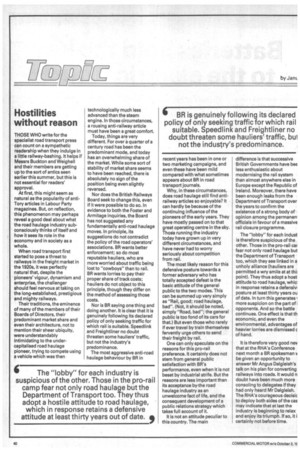Hostilities without reason
Page 32

If you've noticed an error in this article please click here to report it so we can fix it.
THOSE WHO write for the specialist road transport press can count on a sympathetic readership when they indulge in a little railway-bashing. It helps if Messrs Buckton and Weighell and their members are getting up to the sort of antics seen earlier this summer, but this is not essential for readers' approval.
At first, this might seem as natural as the popularity of antiTory articles in Labour Party magazines. But, on reflection, this phenomenon may perhaps reveal a good deal about what the road haulage industry subconsciously thinks of itself and how it sees its role in the economy and in society as a whole.
When road transport first started to pose a threat to railways in the freight market in the 1920s, it was perfectly natural that, despite the pioneers' vigour, dynamism and enterprise, the challenger should feel nervous at taking on the long-established, prestigious and mighty railways.
Their traditions, the eminence of many of the members of their Boards of Directors, their predominant market share and even their architecture, not to mention their sheer ubiquity, were understandably intimidating to the undercapitalised road haulage pioneer, trying to compete using a vehicle which was then technologically much less advanced than the steam engine. In those circumstances, a rousing anti-railway article must have been a great comfort.
Today, things are very different. For over a quarter of a century road has been the predominant mode, and today has an overwhelming share of the market. While some sort of stability of market share seems to have been reached, there is absolutely no sign of the position being even slightly reversed.
Nor does the British Railways Board seek to change this, even if it were possible to do so. In evidence to both the Foster and Armitage inquiries, the Board has not suggested any fundamentally anti-road haulage moves. In principle, its suggestions do not contradict the policy of the road operators' associations. BR wants better enforcement; so do most reputable hauliers, who are more worried about traffic being lost to "cowboys" than to rail. BR wants lorries to pay their proper share of track costs; hauliers do not object to this principle, though they differ on the method of assessing those costs.
Nor is BR saying one thing and doing another. It is clear that it is genuinely following its declared policy of only seeking traffic for which rail is suitable. Speedlink and Freightliner no doubt threaten some hauliers' traffic, but not the industry's predominance.
The most aggressive anti-road haulage behaviour by BR in recent years has been in one or two marketing campaigns, and even these have been mild compared with what sometimes appears about BR in road transport journals.
Why, in these circumstances, does road haulage still find antirailway articles so enjoyable? It can hardly be because of the continuing influence of the pioneers of the early years. They have mostly passed on to that great operating centre in the sky. Those running the industry today have grown up in very different circumstances, and have never had to worry seriously about competition from rail.
The most likely reason for this defensive posture towards a former adversary who has totally accepted defeat is the basic attitude of the general public to the two modes. This can be summed up very simply as "Rail, good; road haulage, bad". (Not, it should be noted, simply "Road, bad"; the general public is too fond of its cars for that.) But even those who rarely if ever travel by train themselves fervently urge others to send their freight by rail.
One can only speculate on the reasons for this pro-rail preference. It certainly does not stem from general public satisfaction with BR's performance, even when it is not beset by industrial strife. But the reasons are less important than its acceptance bythe road haulage industry as an unwelcome fact of life, and the consequent development of a public relations strategy which takes full account of it.
It is not an attitude peculiar to this country. The main
difference is that successive British Governments have bee less enthusiastic about modernising the rail system than almost anywhere else in Europe except the Republic of Ireland. Moreover, there have been enough leaks from the Department of Transport over the years to confirm the existence of a strong body of opinion among the permanen. officials in favour of a massive rail closure programme.
The "lobby" for each indust is therefore suspicious of the other. Those in the pro-rail car fear not only road haulage but the Department of Transport too, which they see linked in a unholy alliance (hauliers are permitted a wry smile at at thil point). They thus adopt a hosti attitude to road haulage, whicl in response retains a defensivi posture at least thirty years ou of date. In turn this generates ) more suspicion on the part of i • opponents. And so the battle continues. One effect is that th economic, and even the environmental, advantages of heavier lorries are dismissed c of hand.
It is therefore very good nev that at the RHA's Conference next month a BR spokesman v be given an opportunity to answer Mr Angus Dalgleish's talk on his plan for converting railways into roads. It would n doubt have been much more consoling to delegates if they had only heard Mr Dalgleish. The RHA's courageous decisic to deploy both sides of the cas may indicate that at last the industry is beginning to relax and enjoy its triumph. If so, it I certainly not before time.












































